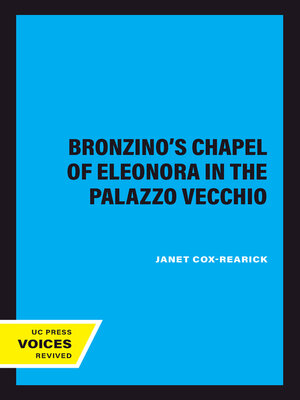Bronzino's Chapel of Eleonora in the Palazzo Vecchio
ebook ∣ California Studies in the History of Art
By Janet Cox-Rearick

Sign up to save your library
With an OverDrive account, you can save your favorite libraries for at-a-glance information about availability. Find out more about OverDrive accounts.
Find this title in Libby, the library reading app by OverDrive.



Search for a digital library with this title
Title found at these libraries:
| Library Name | Distance |
|---|---|
| Loading... |
Do the sacred decorations of a Florentine Renaissance chapel—saints, symbols, and scriptural stories—hold personal and political meanings? Cox-Rearick's ground-breaking book explores the message hidden in the frescoes and altar panels of the Chapel of Eleonora di Toledo, painted in the early 1540s by Agnolo Bronzino for the Spanish-born wife of Duke Cosimo I de Medici. Bronzino, then the chief painter to the Medici court, was largely responsible for the invention in Florence of the highly self-conscious, elegant Maniera style. Cox-Rearick interweaves her account of the Medici biography with an examination of Bronzino's commission in the broader context of his oeuvre.
Cox-Rearick reveals the Chapel of Eleonora as an intimately devised decorative program that transmits messages about its patrons and Medici rule. Detailed color photographs of the newly restored art splendidly document this early tour de force of a major artist whose works are still relatively unexamined.
Do the sacred decorations of a Florentine Renaissance chapel—saints, symbols, and scriptural stories—hold personal and political meanings? Cox-Rearick's ground-breaking book explores the message hidden in the frescoes and altar panels of the Chapel of Ele
Cox-Rearick reveals the Chapel of Eleonora as an intimately devised decorative program that transmits messages about its patrons and Medici rule. Detailed color photographs of the newly restored art splendidly document this early tour de force of a major artist whose works are still relatively unexamined.
Do the sacred decorations of a Florentine Renaissance chapel—saints, symbols, and scriptural stories—hold personal and political meanings? Cox-Rearick's ground-breaking book explores the message hidden in the frescoes and altar panels of the Chapel of Ele







